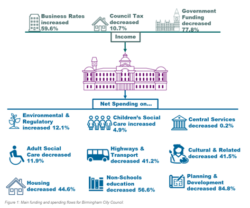By Professor Robert Elliot, Director of Research – Department of Economics The United Nations (UN) annual climate change conference (COP28) is coming at a time when the implications of climate change for the global economy are becoming increasingly evident after a period of floods, wildfires, and other extreme events. COP28 will once again bring together … Continue reading “COP28 and the economics of climate change”
Bublé, Snapper, Kevin and “Christmas Your Way” – it’s Christmas Ads time 2023
By Professor Sarah Montano, Deputy Head of Marketing It’s that time of year, when we anticipate our favourite Christmas ads and wait to see which ones will spark off our emotions! As always John Lewis’ ad is highly anticipated. So, what is the reason that we see such an investment in Christmas ads, what do … Continue reading “Bublé, Snapper, Kevin and “Christmas Your Way” – it’s Christmas Ads time 2023”
King’s Speech – Economic Impact on the West Midlands
By Alice Pugh, Policy and Data Analyst at City-REDI This week the King delivered the first King’s speech since 1951, though the King has previously done the speech when the Queen was unable to attend. However, the speech is not written by the King, it is written by the government of the day. The purpose … Continue reading “King’s Speech – Economic Impact on the West Midlands”
Saluting our Sisters – beyond a month
By Jeannyfar Gelpcke, Senior Executive Advisor to CEO of The E.ON SE Group & Birmingham Business School Advisory Board Member Dear [insert your name here, yes – this is for you], When it comes to things like “Black History Month” I tend to avoid engagement. This is the bitter truth. Although I understand and appreciate … Continue reading “Saluting our Sisters – beyond a month”
Shrinkflation and skimpflation, a permanent loss in what your money can buy
By Alice Pugh, Policy and Data Analyst at City-REDI Shrinkflation is when the size of a product decreases, but the price remains constant. It is a discrete way of increasing the price of a product, without visibly increasing the price of a product that you see on the shelf. Most consumers often don’t realise they … Continue reading “Shrinkflation and skimpflation, a permanent loss in what your money can buy”
London Wins Again – The Debacle of the UK’s High-speed Rail ‘strategy’
By Donald Houston, Professor of Regional Economic Development and Rebecca Riley, Associate Professor Enterprise, Engagement, and Impact HS2 has always suffered from a branding failure. HS2 sounds rather anodyne and the ‘2’ reminds those north of London that they were only playing catch-up on London’s existing HS1 to the south (the Channel Tunnel rail link). … Continue reading “London Wins Again – The Debacle of the UK’s High-speed Rail ‘strategy’ ”
Intergenerational Fairness and the UK State Pension
By Andy Mullineux, Emeritus Professor of Financial Economics, Centre for Responsible Business and CHASM The UK scheme is not generous when compared to international peers, indeed rather the reverse, but it does have a safety net for those most heavily reliant upon it. The UK’s ‘triple lock’ state pension scheme was designed to ensure pension … Continue reading “Intergenerational Fairness and the UK State Pension”
Taxing Behaviour
By Andy Mullineux, Emeritus Professor of Financial Economics, Centre for Responsible Business and CHASM So-called ‘sin taxes’ are controversial, given the addictive nature of the underlying consumption, and are opposed by libertarians. Moreover, hypothecation to fund the NHS and treatment of the associated addictions might further increase their acceptability. The new Alcohol Duty regime, which … Continue reading “Taxing Behaviour”
Wilko – What went wrong?
By Professor Sarah Montano Department of Marketing Over the last few weeks, the retail sector has been reeling from the news that we have lost yet another familiar name from the high street. Wilko, the much-loved homeware and household goods store, has gone into administration, causing all 400 stores to close and the loss of … Continue reading “Wilko – What went wrong?”
The Impact of the Black Hole in Local Authority Budgets, and its impact on services
By Associate Professor Rebecca Riley and Dr. Abigail Taylor, City-REDI The BBC has recently highlighted the looming black hole in Local authority Budgets. The average council now faces a £33m ($42m) predicted deficit by 2025-26 – a rise of 60% from £20m two years ago. Unison said the situation meant some councils would not be … Continue reading “The Impact of the Black Hole in Local Authority Budgets, and its impact on services”











